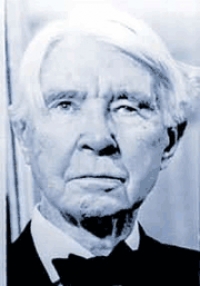On this date in 1878, poet and Pulitzer Prize-winning biographer Carl August Sandburg was born in Galesburg, Ill., to parents of Swedish-Lutheran heritage. The second of seven children, he quit school after the eighth grade and worked at a variety of jobs such as milkman, porter, bricklayer and farm laborer for the next decade. In 1897 he lived as a hobo. He would later perform the folk songs he learned on the road and compiled them into two song books.
Sandburg enlisted in the U.S. Army during the Spanish-American War in 1898 and was stationed in Puerto Rico. After a two-week stint at West Point, he failed a math and grammar exam and left the military academy. He then attended the Universalist-founded Lombard College in Galesburg. Attracted to labor concerns, he became an organizer for the Wisconsin Social Democratic Party and met his wife-to-be Lilian Steichen at party headquarters in Milwaukee. They were wed in 1908 and had three daughters, Margaret, Jane and Helga.
He worked from 1910-12 as a secretary for Emil Seidel, Milwaukee’s socialist mayor, then joined the Chicago Daily News as a reporter. Much of his poetry, such as “Chicago,” focused on the city he famously described as “Hog Butcher for the World/Tool Maker, Stacker of Wheat/Player with Railroads and the Nation’s Freight Handler,/Stormy, Husky, Brawling, City of the Big Shoulders.”
Sandburg earned Pulitzers for the 103-poem Corn Huskers (1919), Abraham Lincoln: The War Years (1940) and Complete Poems (1951). His Lincoln work and the earlier Abraham Lincoln: The Prairie Years (1926) became very influential histories. He was also remembered by generations of children for his Rootabaga Stories (1922). His 1927 anthology, The American Songbag, enjoyed enormous popularity, going through many editions. He often sang and accompanied himself on guitar at lectures and poetry recitals.
A lifelong Unitarian, he died at age 89 in his longtime home in Flat Rock, N.C. (D. 1967)


